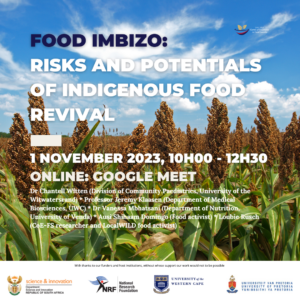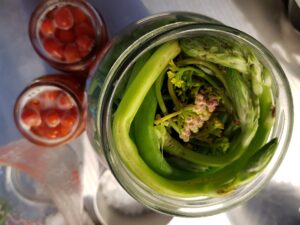Time: 10:00 - 12:30
Venue: Google Meet

On the back of Heritage Month in September, and the focus on World Food Day this October, there have been several events that have focused on indigenous food culture, food heritage and food identity.
In the words of Minister of Sports, Arts and Culture, Zizi Kodwa: “Our rich and diverse cultures should unite us as a nation to promote and preserve our unique heritage by safeguarding it as a valuable resource for current and future generations”. While the Minister was referring to sports and the arts, this holds for food, our fauna and flora.
Due to their resilience to challenging conditions, indigenous foods hold great potential to advance climate change adaptation. Their preservation and cultivation can promote resilient and diverse ecosystems. They can also contribute to livelihoods for smallholder farmers, food traders and food service workers. Indigenous foods are more nutritionally dense and diverse than conventional staples. In addition, their consumption can re-connect us to the rich microbial diversity of ancestral soils, reviving the human microbiome and improve digestive and mental health, while reducing vulnerability to non-communicable diseases.

Pickled veldkool. Photo Loubie Rusch.
Recently, AgriLuxe Marketing hosted a Wild Feast Dialogue in partnership with Tiger Brands and the World Food Programme to facilitate market linkages, particularly for smallholder farmers and other food producers, in the agritourism, health and wellness, and food waste management spaces. While such dialogues are important and instrumental in facilitating knowledge exchange and innovation, food justice and food sovereignty advocates warn of the risks of commodification, exploitation and appropriation of indigenous knowledge for predatory entrepreneurship.
To develop appropriate governance responses that guard against these risks, food activists and officials must learn more about indigenous food systems and their contribution to diverse and sustainable diets.
Join the Food Imbizo, which is embedded in the DSI-NRF Centre of Excellence in Food Security (CoE-FS), for an interactive online discussion on the potential and risks of the revival of local and indigenous foods.
The CoE-FS is hosted by the University of the Western Cape (UWC), and co-hosted by the University of Pretoria. The Food Imbizo secretariat is led by Professor Daniel Tevera (Department of Geography, Environmental Studies and Tourism, UWC) and Florian Kroll (CoE-FS and Institute for Poverty, Land and Agrarian Studies, UWC researcher).
Food Imbizo: Risks and potentials of indigenous food revival
Facilitator: Dr Chantell Witten (Division of Community Paediatrics, University of the Witwatersrand) – Contextualising indigenous foods within the context of anti-processed food movements and food justice.
Speakers and panellists:
- Loubie Rusch (CoE-FS researcher and LocalWILD food activist) – Introducing the LocalWILD food hub (read more here)
- Professor Jeremy Klaasen (Department of Medical Biosciences, UWC) – Biodiversity economy of indigenous food sources
- Dr Vanessa Mbhatsani (Department of Nutrition, University of Venda) – Indigenous food practices and the nutrition contribution to diets
- Ausi Shihaam Domingo (Food activist) – Indigenous food practices, culture and identity.
Details:
- Where: Online – Google Meet
- When: 1 November 2023, 10h00-12h30.
Upcoming Events
Our GOALS
We recognise that producers, processors, distributors and consumers are incorporated into the food system under varying terms and returns. We also recognise the economic, social, human and environmental health impacts associated with food security. Therefore our goal is to conduct research, build capacity and disseminate findings that will promote a sustainable food system in South Africa.
Our MISSION
Our research is concerned with the scale, nature, causes and consequences of food insecurity in South Africa and elsewhere on the African continent. Thus our mission is to investigate products, technologies, processes and policies that can reduce food insecurity and mitigate its negative outcomes. We seek to make a difference to food security by linking innovative science with critical enquiry.



